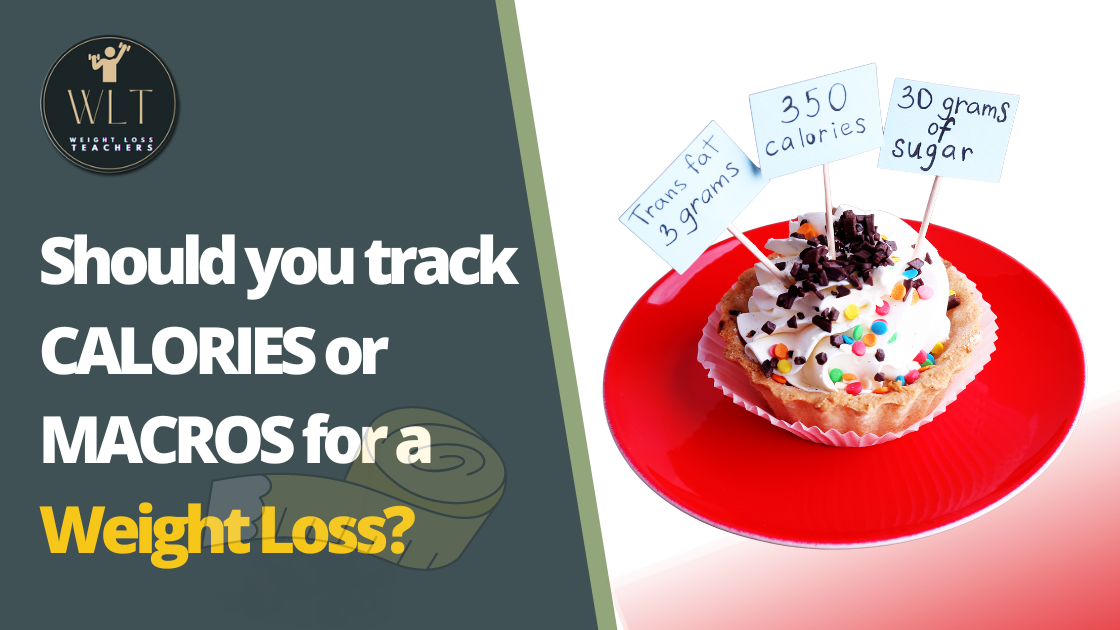
Should you track CALORIES or MACROS for a Weight Loss?
Trying to lose weight but unsure whether to track calories or macros? Both methods have their unique advantages, and the choice depends on your personal goals and lifestyle. Tracking calories focuses on the quantity of food, while tracking macros emphasizes the quality and balance of nutrients.
Understanding the benefits and differences of each approach can help you make an informed decision and optimize your weight loss journey. Dive into the pros and cons of tracking calories versus macros to find the best strategy for your weight loss goals.
Table of Contents
Understanding Calorie Tracking

What is Calorie Tracking?
Calorie tracking is a widely used method for weight loss that involves keeping track of the number of calories consumed each day. The fundamental principle behind calorie tracking is to create a calorie deficit, wherein the number of calories burned through daily activities and metabolism exceeds the number of calories consumed. This deficit forces the body to utilize stored fat as an energy source, leading to weight loss over time.
Here’s a balanced diet chart that incorporates a variety of nutrients essential for good health:
| Meal | Food Group | Examples | Portion |
|---|---|---|---|
| Breakfast | Protein | Eggs, Greek yogurt, tofu scramble, lean meats. | 1-2 servings |
| Whole Grains | Oatmeal, whole grain toast, quinoa. | 1 serving | |
| Fruits | Berries, banana, apple. | 1 serving | |
| Mid-Morning Snack | Protein | Nuts, seeds, cheese. | 1 serving |
| Fruits/Vegetables | Carrot sticks, cucumber slices, fruit smoothie. | 1 serving | |
| Lunch | Protein | Grilled chicken, fish, beans, lentils. | 1-2 servings |
| Vegetables | Mixed salad, steamed vegetables. | 2 servings | |
| Whole Grains | Brown rice, whole grain bread, barley. | 1 serving | |
| Healthy Fats | Avocado, olive oil, nuts. | 1 serving | |
| Afternoon Snack | Protein | Cottage cheese, boiled eggs, hummus. | 1 serving |
| Fruits/Vegetables | Apple slices, bell pepper sticks, cherry tomatoes. | 1 serving | |
| Dinner | Protein | Baked salmon, tofu, turkey. | 1-2 servings |
| Vegetables | Stir-fried or roasted vegetables. | 2 servings | |
| Whole Grains | Quinoa, whole wheat pasta, sweet potatoes. | 1 serving | |
| Healthy Fats | Flaxseeds, chia seeds, avocado. | 1 serving | |
| Evening Snack | Dairy or Dairy Alternatives | Low-fat yogurt, almond milk, cheese. | 1 serving |
| Fruits/Vegetables | Berries, sliced carrots, celery sticks. | 1 serving |
There are various ways to practice calorie tracking. One common approach is to maintain a food diary, wherein individuals jot down the types and quantities of food they eat throughout the day. This method allows for a manual calculation of the caloric intake. Another option is to use calorie tracking apps, which provide a convenient way to log meals, snacks, and beverages while automatically calculating the total calories consumed. Additionally, many packaged foods now include calorie information on their labels, allowing individuals to estimate their intake based on portion sizes.
Pros of Calorie Tracking
Calorie tracking offers several advantages, making it a popular choice for those seeking a straightforward method to manage their weight.
- Simplicity and Ease of Understanding: Calorie tracking is relatively simple to grasp, making it accessible to individuals with varying levels of nutritional knowledge. Unlike complicated dietary plans, calorie tracking focuses on the quantity of food consumed rather than specific food choices.
- Flexibility in Food Choices: With calorie tracking, there are no strict restrictions on food types or food groups. As long as individuals stay within their designated calorie limit, they can enjoy a diverse range of foods. This flexibility can make the weight loss journey more enjoyable and sustainable.
- Portion Awareness: By monitoring their calorie intake, individuals become more mindful of portion sizes. Over time, this awareness can help them develop healthier eating habits, preventing overeating and promoting better control of their food consumption.
Cons of Calorie Tracking
While calorie tracking has its benefits, there are potential drawbacks that individuals should consider:
- Nutrient Quality: Calorie tracking focuses solely on the quantity of calories consumed and do not take into account the nutrient quality of the foods consumed. Therefore, individuals might end up prioritizing low-nutrient, high-calorie processed foods over more nutrient-dense options. This could lead to nutritional deficiencies and feelings of hunger, even within the calorie limit.
- Metabolic Adaptation: Prolonged calorie restriction may lead to metabolic adaptation, wherein the body adjusts to the lower caloric intake by slowing down metabolism. This can make it harder to continue losing weight, leading to plateaus in the weight loss journey.
- Psychological Impact: For some individuals, calorie tracking can become obsessive and lead to an unhealthy preoccupation with food and numbers. This can contribute to the development of disordered eating habits, such as orthorexia or anorexia nervosa.
- Inaccuracy in Calorie Estimations: Calorie tracking, especially when done manually, can be prone to errors in estimating portion sizes and caloric content. This can lead to inaccuracies in the overall calorie count, affecting weight loss progress.
Addressing these cons requires a balanced and mindful approach to calorie tracking. It is essential to prioritize nutrient-dense foods, avoid excessive calorie restriction, and be aware of the potential psychological implications of tracking.
Exploring Macro Tracking

What is Macro Tracking?
Macro tracking, also known as macronutrient tracking, involves monitoring the proportions of macronutrients – carbohydrates, proteins, and fats – in one’s daily diet. Unlike calorie tracking, which focuses on the overall energy content of foods, macro tracking emphasizes the balance of macronutrients to optimize weight loss and overall health.
Here’s a comprehensive table highlighting the protein content in various vegetables:
| Vegetable | Protein Content (per 100g) | Description |
|---|---|---|
| Edamame (Soybeans) | 11.91 grams | Young soybeans, often eaten as a snack or added to salads and stir-fries. |
| Lentils | 9.02 grams | A legume high in protein and fiber, used in soups, stews, and salads. |
| Chickpeas (Garbanzo Beans) | 8.86 grams | A versatile legume used in hummus, salads, and stews. |
| Peas | 5.42 grams | Fresh or frozen peas, great in soups, stews, and as a side dish. |
| Spinach | 2.86 grams | A leafy green used in salads, smoothies, and cooked dishes. |
| Kale | 2.92 grams | A nutrient-dense leafy green, great in salads, smoothies, and as chips. |
| Broccoli | 2.82 grams | A cruciferous vegetable, steamed, roasted, or added to various dishes. |
| Asparagus | 2.20 grams | A spring vegetable, often steamed or grilled. |
| Brussels Sprouts | 3.38 grams | Mini cabbages, often roasted or steamed. |
| Artichokes | 3.27 grams | High in fiber and protein, used in salads and dips. |
| Mushrooms | 3.09 grams | Various types used in soups, stews, and stir-fries. |
| Potatoes | 2.05 grams | Starchy tuber used in a variety of dishes, though not a high protein source. |
| Sweet Corn | 3.27 grams | A grain often treated as a vegetable, high in carbs but also contains protein. |
| Cauliflower | 1.92 grams | Versatile cruciferous vegetable, used in rice substitutes, soups, and roasted dishes. |
| Avocado | 2.00 grams | A fruit high in healthy fats and protein, used in salads, toast, and smoothies. |
| Green Beans | 1.83 grams | Often steamed or sautéed, a low-calorie vegetable with protein. |
| Bell Peppers | 0.86 grams | Crunchy and colorful, used in salads, stir-fries, and roasted dishes. |
| Zucchini | 1.21 grams | A summer squash used in soups, salads, and as a pasta substitute. |
| Carrots | 0.93 grams | Root vegetable eaten raw, cooked, or in juices. |
| Beetroot | 1.68 grams | Root vegetable used in salads, smoothies, and roasted dishes. |
Including these vegetables in your diet can help increase your protein intake, especially if you follow a vegetarian or vegan diet.
Pros of Macro Tracking
- Optimizing Weight Loss: One of the main advantages of macro tracking is its potential to optimize weight loss. By ensuring the right balance of macronutrients, individuals can enhance their satiety levels, reduce cravings, and better manage their appetite. For instance, consuming an adequate amount of protein can promote feelings of fullness and help preserve lean muscle mass during weight loss.
- Personalized Approach: Macro tracking allows for a more personalized approach to nutrition. By calculating the ideal macro ratios based on factors such as weight, height, age, and activity level, individuals can tailor their diet to suit their unique needs and goals.
- Improved Body Composition: Macro tracking can help individuals achieve a healthier body composition by supporting fat loss while preserving muscle mass. This is particularly beneficial for those who engage in strength training or resistance exercises to shape their physique.
- Balanced Nutrient Intake: Paying attention to macronutrient proportions can help individuals maintain a balanced and nutritious diet. By prioritizing a variety of nutrient-dense foods, they can ensure they are obtaining essential vitamins, minerals, and other beneficial nutrients.
Cons of Macro Tracking
- Complexity and Time-Consuming: Unlike calorie tracking, macro tracking requires more effort and attention to detail. It involves calculating and monitoring the proportions of carbohydrates, proteins, and fats in each meal, which can be time-consuming, especially for those with busy lifestyles.
- Potential Dietary Restrictions: Macro tracking might pose challenges for individuals with specific dietary restrictions, such as those following a gluten-free, vegan, or other specialized diet. Meeting macro targets while adhering to such restrictions may require extra planning and creativity.
- Potential Obsession with Numbers: Just like calorie tracking, macro tracking can also lead to an excessive focus on numbers and foster an unhealthy relationship with food. This can turn mealtime into a constant calculation rather than an enjoyable experience.
- Not All Macros Are Equal: While macro tracking is valuable, it is essential to remember that not all sources of each macronutrient are equal in terms of nutritional value. Prioritizing whole, unprocessed foods over highly refined ones is crucial for overall health, even within the context of macro tracking.
Note: There might be affiliate links mentioned here. We may receive a commission if you purchase a product through an affiliate link. There is no additional charge for you. Please do your own research before making any online purchases.
Making the Right Choice

Factors Influencing the Decision
The choice between calorie tracking and macro tracking depends on several factors. Individuals should consider the following aspects when making their decision:
- Personal Preferences: Some people may find calorie tracking more straightforward and less overwhelming, while others may appreciate the structure and potential benefits of macro tracking.
- Health and Fitness Goals: Individuals with specific body composition goals, such as building muscle or improving athletic performance, might find macro tracking more aligned with their objectives.
- Time and Effort: The level of commitment an individual is willing to invest in tracking and planning meals can play a role in the decision-making process.
- Dietary Restrictions and Lifestyle: People with dietary restrictions or busy lifestyles may find one method more manageable than the other.
Which One Should You Choose?
Ultimately, the decision to choose between calorie tracking and macro tracking rests on individual preferences, goals, and lifestyle. Both methods can be effective for weight loss, provided they are implemented mindfully and with consideration of nutritional quality.
- Calorie Tracking: Choose calorie tracking if you prefer a simpler, less time-consuming approach. Focus on consuming nutrient-dense foods while staying within your calorie limit to ensure overall health and sustainable weight loss.
- Macro Tracking: Opt for macro tracking if you are committed to fine-tuning your diet and achieving specific body composition goals. Balance macronutrient ratios while being mindful of food choices to enhance satiety and promote overall well-being.
Achieving Long-term Success

The Importance of Consistency
Consistency is the key to successful weight management. Regardless of the chosen tracking method, establishing a consistent routine and adhering to it will yield better results over time. Avoid extreme calorie deficits or macronutrient imbalances, as they can lead to negative effects on metabolism and overall health.
“Health is a state of complete physical, mental, and social well-being and not merely the absence of disease or infirmity.” – World Health Organization
Embracing Patience in the Weight Loss Journey
Weight loss is a gradual process, and plateaus or fluctuations are normal. Patience and perseverance are essential in navigating these periods. Avoid falling into the trap of seeking quick fixes, as they rarely lead to sustainable results.
Focusing on Sustainable Lifestyle Changes
Instead of focusing solely on tracking, shift the focus toward adopting sustainable lifestyle changes. This includes incorporating regular physical activity, making healthier food choices, managing stress, and getting adequate sleep. These changes are crucial for long-term success in weight management and overall well-being.
FAQs (Frequently Asked Question)
Q1. What are the main differences between calorie tracking and macro tracking?
A1. Calorie tracking focuses solely on monitoring the number of calories consumed each day, while macro tracking involves keeping track of the proportion of macronutrients (carbohydrates, proteins, and fats) in the diet. Calorie tracking is simpler and more flexible in terms of food choices, while macro tracking offers a personalized approach to optimize weight loss and overall health.
Q2. Can I combine calorie tracking and macro tracking for better results?
A2. Yes, it is possible to combine both methods for weight management. Some individuals may find it beneficial to start with calorie tracking to develop portion awareness and then transition to macro tracking to fine-tune their nutrient balance. The key is to find a method that fits your preferences and lifestyle.
Q3. Will calorie tracking lead to weight loss even if I eat unhealthy foods?
A3. Calorie tracking can lead to weight loss, even if unhealthy foods are consumed, as long as a calorie deficit is maintained. However, relying solely on unhealthy foods may lead to nutritional deficiencies and impact overall health in the long run. It is essential to prioritize nutrient-dense foods for better results and well-being.
Q4. Is macro tracking suitable for individuals with specific dietary restrictions, such as vegans or gluten-free diets?
A4. Macro tracking can be adapted to suit various dietary restrictions. While it may require extra planning and attention, it is possible to meet macro targets while following a vegan or gluten-free diet. The key is to choose nutrient-dense foods that align with your dietary preferences and restrictions.
Q5. How do I calculate my ideal macro ratios for macro tracking?
A5. To calculate your ideal macro ratios, consider factors such as your weight, height, age, activity level, and fitness goals. Several online calculators and macro tracking apps can help you determine the appropriate proportions of carbohydrates, proteins, and fats based on these factors.
Q6. Can calorie tracking lead to metabolic adaptation and plateaus in weight loss?
A6. Prolonged calorie restriction can potentially lead to metabolic adaptation, where the body adjusts to the lower caloric intake by slowing down metabolism. This may result in weight loss plateaus. To avoid this, it is important to avoid drastic calorie deficits and incorporate periodic refeeds or adjustments in caloric intake.
Q7. Will macro tracking help me build muscle and improve body composition?
A7. Macro tracking can support muscle preservation and improve body composition when combined with appropriate strength training or resistance exercises. Consuming adequate protein and maintaining a balanced nutrient intake can contribute to lean muscle development while losing body fat.
Q8. Is it necessary to track calories or macros forever to maintain weight loss?
A8. Tracking calories or macros can be a helpful tool in achieving weight loss goals, but it may not be necessary to do it forever. Once you have developed mindful eating habits and an understanding of portion sizes, you can transition to intuitive eating while continuing to make healthier food choices.
Q9. How do I avoid becoming obsessed with tracking numbers and food?
A9. To prevent becoming obsessed with tracking, it is important to maintain a balanced approach to nutrition. Allow flexibility in your diet, enjoy occasional treats, and focus on overall well-being rather than solely on numbers. If you find yourself becoming overly preoccupied, consider seeking support from a qualified nutritionist or mental health professional.
Q10. Which method is better for long-term weight management: calorie tracking or macro tracking?
A10. The effectiveness of both methods for long-term weight management depends on individual preferences and adherence. Some individuals may find calorie tracking simpler and easier to sustain, while others may prefer the personalized approach of macro tracking. The key to long-term success lies in consistency, moderation, and a focus on sustainable lifestyle changes, regardless of the chosen tracking method.
Conclusion
Calorie tracking and macro tracking are both effective methods for weight loss, but they cater to different preferences and goals. Calorie tracking offers simplicity and flexibility, while macro tracking emphasizes optimized weight loss and nutrient balance. The decision should consider individual factors such as preferences, lifestyle, and dietary restrictions. Whichever method is chosen, the key to success lies in maintaining consistency, practicing patience, and focusing on sustainable lifestyle changes for lasting results and improved overall health and well-being.
Disclaimer: The information provided in this article is for educational purposes only and should not be considered as a substitute for medical advice. Consult a healthcare professional before implementing any home remedies or making significant changes to your lifestyle.







